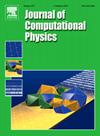A fully-decoupled second-order-in-time and unconditionally energy stable scheme for the Cahn-Hilliard-Navier-Stokes equations with variable density
IF 3.8
2区 物理与天体物理
Q2 COMPUTER SCIENCE, INTERDISCIPLINARY APPLICATIONS
引用次数: 0
Abstract
In this paper, we develop a second-order, fully decoupled, and energy-stable numerical scheme for the Cahn-Hilliard-Navier-Stokes model for two phase flow with variable density and viscosity. We propose a new decoupling Constant Scalar Auxiliary Variable (D-CSAV) method which is easy to generalize to schemes with high order accuracy in time. The method is designed using the “zero-energy-contribution” property while maintaining conservative time discretization for the “non-zero-energy-contribution” terms. A new set of scalar auxiliary variables is introduced to develop second-order-in-time, unconditionally energy stable, and decoupling-type numerical schemes. We also introduce a stabilization parameter α to improve the stability of the scheme by slowing down the dynamics of the scalar auxiliary variables. Our algorithm simplifies to solving three independent linear elliptic systems per time step, two of them with constant coefficients. The update of all scalar auxiliary variables is explicit and decoupled from solving the phase field variable and velocity field. We rigorously prove unconditional energy stability of the scheme and perform extensive benchmark simulations to demonstrate accuracy and efficiency of the method.
针对密度可变的卡恩-希利亚德-纳维尔-斯托克斯方程的完全解耦的二阶时间和无条件能量稳定方案
本文针对变密度和变粘度两相流的Cahn-Hilliard-Navier-Stokes模型,建立了一种二阶、完全解耦和能量稳定的数值格式。提出了一种新的解耦常标量辅助变量法(D-CSAV),该方法易于在时间上推广到具有高阶精度的解耦方案。该方法利用“零能量贡献”特性,同时对“非零能量贡献”项保持保守的时间离散化。引入一组新的标量辅助变量来建立二阶时间、无条件能量稳定、解耦型数值格式。我们还引入了一个稳定参数α,通过减缓标量辅助变量的动态变化来提高方案的稳定性。我们的算法简化为每个时间步求解三个独立的线性椭圆系统,其中两个是常系数的。所有标量辅助变量的更新都是显式的,并且与求解相场变量和速度场解耦。我们严格地证明了该方案的无条件能量稳定性,并进行了大量的基准模拟,以证明该方法的准确性和效率。
本文章由计算机程序翻译,如有差异,请以英文原文为准。
求助全文
约1分钟内获得全文
求助全文
来源期刊

Journal of Computational Physics
物理-计算机:跨学科应用
CiteScore
7.60
自引率
14.60%
发文量
763
审稿时长
5.8 months
期刊介绍:
Journal of Computational Physics thoroughly treats the computational aspects of physical problems, presenting techniques for the numerical solution of mathematical equations arising in all areas of physics. The journal seeks to emphasize methods that cross disciplinary boundaries.
The Journal of Computational Physics also publishes short notes of 4 pages or less (including figures, tables, and references but excluding title pages). Letters to the Editor commenting on articles already published in this Journal will also be considered. Neither notes nor letters should have an abstract.
 求助内容:
求助内容: 应助结果提醒方式:
应助结果提醒方式:


